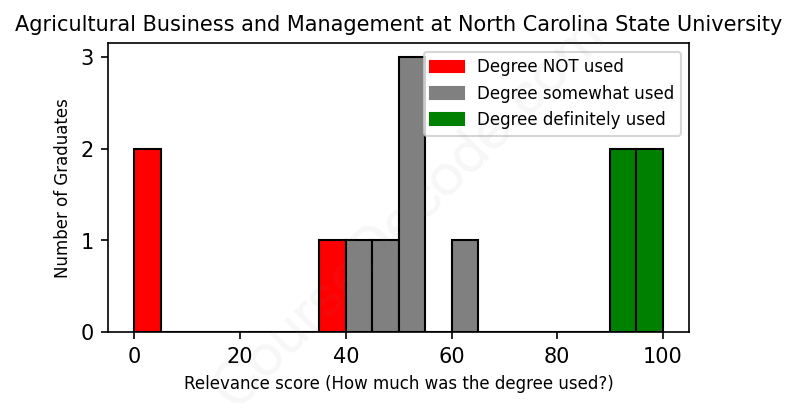
First, some facts. Of the Agricultural Business and Management graduates from North Carolina State University we've analyzed , here's how many have used (or NOT used) their degree in their career:

These are estimates based on AI analysis of 13 LinkedIn profiles (see below).
The verdict? Significantly below average. Overall, with an average relevance score of 54%, Agricultural Business and Management graduates from North Carolina State University have a much lower likelihood (-13%) of finding work in this field compared to the average graduate across all fields:
And for comparison, here's the chart for all profiles we've looked at across all degrees.
Also, after graduating, 46% of these graduates have pursued further education other than another Bachelor's degree (such as a Masters degree or other), compared to the average across all profiles of 35%. This suggests you may need more than just a Bachelors degree to be competitive as a Agricultural Business and Management graduate.
See the details:
|
Relevance score: 50% We think this person has gone into a career only somewhat relevant to their degree. We think this person has gone into a career only somewhat relevant to their degree.
DEGREE INFOGraduated in 2014 from North Carolina State University with a Bachelor's degree in Agricultural Business and Management. Also pursued further education since (see below). JOB HISTORY SINCE GRADUATIONSales And Marketing Specialist Self-employed Apr 2014 - Present FURTHER DEGREES DONE SINCE GRADUATINGAssociate of Science - ASFayetteville Technical Community College 2015 - 2017 ABOUTNo information provided. |
The top 10 most common jobs done by the graduates we've analyzed (ranked most common to least) are:
From the LinkedIn profiles of graduates in Agricultural Business and Management from North Carolina State University, it seems like the most common types of jobs these graduates have taken fall into sales and management roles, especially related to agriculture. Many have found positions like Agronomy Sales Managers or roles in various agricultural companies that align closely with their studies, like Agronomists at different firms. However, there’s a noticeable trend where some graduates veer off into roles that only tangentially relate to agricultural business, such as in retail or as sales associates in non-agricultural sectors. This suggests that while some graduates are effectively using their degrees in relevant agricultural settings, others may not be fully capitalizing on their training.
Overall, it appears that the relevance of jobs to their Agricultural Business and Management degrees varies a lot. There are definitely positions that directly draw on the skills and knowledge gained from their studies, especially in roles like Agronomy Sales Manager or positions at agricultural firms. On the flip side, a significant number are working in jobs that don't leverage their specialized training at all, focusing instead on general sales, management, or roles in other industries altogether. This mix indicates that while their degree provides a solid foundation for a career in agriculture, the job market might not always align perfectly with their field of study.
Here is a visual representation of the most common words in job titles for Agricultural Business and Management graduates (this is across all Agricultural Business and Management graduates we've analyzed, not just those who went to North Carolina State University):

From the profiles analyzed, it seems that graduates with a degree in Agricultural Business and Management from North Carolina State University generally kick off their careers in positions related to sales, management, or agronomy right after graduation. For example, many of the early roles include sales positions, sales management, and even some technical roles related to agriculture, like agronomy. It’s pretty clear that these graduates tend to leverage their education in agriculture-related fields initially, especially in roles connected to sales and production in the agricultural sector. However, as they gain more experience, a number of them transition into leadership roles or even start their own businesses, indicating a career progression that seems to capitalize on their roots in agricultural management.
Five to ten years down the line, many graduates have moved into significant managerial or entrepreneurial roles. For instance, we see graduates becoming agronomy sales managers, operations managers, or even starting their own agronomic service companies. It’s not all sunshine, though; while some have progressed well and are in relevant careers, there are also a few who have taken detours into roles that seem less related to agricultural business – like positions in retail and general contracting. Overall, it looks like a solid foundation for careers in the agricultural sector exists, but the trajectory can vary widely, with some graduates thriving in agriculture-related fields and others exploring different paths. So, if you're considering this degree, it looks promising if you're keen on a career in agriculture or agribusiness, but keep an open mind about where your skills might take you!
Getting a Bachelor’s degree in Agricultural Business and Management at North Carolina State University is pretty manageable overall, but it really depends on your interests and strengths. If you're into farming, economics, and understanding how businesses work in the ag sector, you might find it more on the easier side. It involves a mix of technical stuff like economics and finance, along with practical applications in agriculture, which can be a bit challenging if math isn’t your thing. But don’t sweat it too much; most students say it’s definitely doable with some effort, especially if you stay organized and engage with the coursework. So, if you’re passionate about agriculture and business, you’ll probably find it a rewarding experience rather than a super tough grind.
Most commonly, in the LinkedIn profiles we've looked at, it takes people 4 years to finish a Bachelor degree in Agricultural Business and Management.
Looking at these Agricultural Business and Management grads from North Carolina State University, it seems like they've been able to land some fairly decent jobs after graduation, especially the ones who graduated earlier, like in 2012 and 2013. Many of them have moved up the ladder into roles like agronomy sales manager or even president of their own company, which usually means they’re bringing in some good cash. However, if you check out the more recent grads, like the ones from 2022 and 2023, they’re still starting out with jobs that are more entry-level, which typically pays less while they build up their experience. So overall, while it looks like the earlier graduates are doing pretty well financially, the newer ones are still finding their footing in the job market.
Here is a visual representation of the most common words seen in the "about" section of LinkedIn profiles who have a Bachelor degree in Agricultural Business and Management (this is across all Agricultural Business and Management graduates we've analyzed, not just those who went to North Carolina State University). This may or may not be useful:

Here are all colleges offering a Bachelor degree in Agricultural Business and Management (ordered by the average relevance score of their Agricultural Business and Management graduates, best to worst) where we have analyzed at least 10 of their graduates:
| College | Score | Count |
|---|---|---|
 North Carolina State University North Carolina State University
|
54 | 13 |